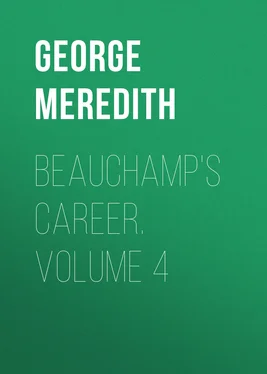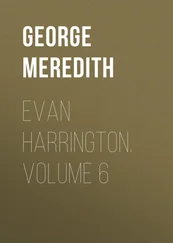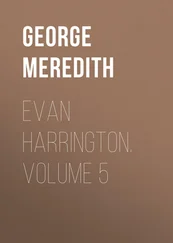George Meredith - Beauchamp's Career. Volume 4
Здесь есть возможность читать онлайн «George Meredith - Beauchamp's Career. Volume 4» — ознакомительный отрывок электронной книги совершенно бесплатно, а после прочтения отрывка купить полную версию. В некоторых случаях можно слушать аудио, скачать через торрент в формате fb2 и присутствует краткое содержание. Издательство: Иностранный паблик, Жанр: foreign_prose, literature_19, foreign_antique, на английском языке. Описание произведения, (предисловие) а так же отзывы посетителей доступны на портале библиотеки ЛибКат.
- Название:Beauchamp's Career. Volume 4
- Автор:
- Издательство:Иностранный паблик
- Жанр:
- Год:неизвестен
- ISBN:нет данных
- Рейтинг книги:4 / 5. Голосов: 1
-
Избранное:Добавить в избранное
- Отзывы:
-
Ваша оценка:
- 80
- 1
- 2
- 3
- 4
- 5
Beauchamp's Career. Volume 4: краткое содержание, описание и аннотация
Предлагаем к чтению аннотацию, описание, краткое содержание или предисловие (зависит от того, что написал сам автор книги «Beauchamp's Career. Volume 4»). Если вы не нашли необходимую информацию о книге — напишите в комментариях, мы постараемся отыскать её.
Beauchamp's Career. Volume 4 — читать онлайн ознакомительный отрывок
Ниже представлен текст книги, разбитый по страницам. Система сохранения места последней прочитанной страницы, позволяет с удобством читать онлайн бесплатно книгу «Beauchamp's Career. Volume 4», без необходимости каждый раз заново искать на чём Вы остановились. Поставьте закладку, и сможете в любой момент перейти на страницу, на которой закончили чтение.
Интервал:
Закладка:
George Meredith
Beauchamp's Career – Volume 4
CHAPTER XXVI
MR. BLACKBURN TUCKHAM
Some time after Beauchamp had been seen renewing his canvass in Bevisham a report reached Mount Laurels that he was lame of a leg. The wits of the opposite camp revived the FRENCH MARQUEES, but it was generally acknowledged that he had come back without the lady: she was invisible. Cecilia Halkett rode home with her father on a dusky Autumn evening, and found the card of Commander Beauchamp awaiting her. He might have stayed to see her, she thought. Ladies are not customarily so very late in returning from a ride on chill evenings of Autumn. Only a quarter of an hour was between his visit and her return. The shortness of the interval made it appear the deeper gulf. She noticed that her father particularly inquired of the man-servant whether Captain Beauchamp limped. It seemed a piece of kindly anxiety on his part. The captain was mounted, the man said. Cecilia was conscious of rumours being abroad relating to Nevil's expedition to France; but he had enemies, and was at war with them, and she held herself indifferent to tattle. This card bearing his name, recently in his hand, was much more insidious and precise. She took it to her room to look at it. Nothing but his name and naval title was inscribed; no pencilled line; she had not expected to discover one. The simple card was her dark light, as a handkerchief, a flower, a knot of riband, has been for men luridly illuminated by such small sparks to fling their beams on shadows and read the monstrous things for truths. Her purer virgin blood was, not inflamed. She read the signification of the card sadly as she did clearly. What she could not so distinctly imagine was, how he could reconcile the devotion to his country, which he had taught her to put her faith in, with his unhappy subjection to Madame de Rouaillout. How could the nobler sentiment exist side by side with one that was lawless? Or was the wildness characteristic of his political views proof of a nature inclining to disown moral ties? She feared so; he did not speak of the clergy respectfully. Reading in the dark, she was forced to rely on her social instincts, and she distrusted her personal feelings as much as she could, for she wished to know the truth of him; anything, pain and heartrending, rather than the shutting of the eyes in an unworthy abandonment to mere emotion and fascination. Cecilia's love could not be otherwise given to a man, however near she might be drawn to love—though she should suffer the pangs of love cruelly.
She placed his card in her writing-desk; she had his likeness there. Commander Beauchamp encouraged the art of photography, as those that make long voyages do, in reciprocating what they petition their friends for. Mrs. Rosamund Culling had a whole collection of photographs of him, equal to a visual history of his growth in chapters, from boyhood to midshipmanship and to manhood. The specimen possessed by Cecilia was one of a couple that Beauchamp had forwarded to Mrs. Grancey Lespel on the day of his departure for France, and was a present from that lady, purchased, like so many presents, at a cost Cecilia would have paid heavily in gold to have been spared, namely, a public blush. She was allowed to make her choice, and she chose the profile, repeating a remark of Mrs. Culling's, that it suggested an arrow-head in the upflight; whereupon Mr. Stukely Culbrett had said, 'Then there is the man, for he is undoubtedly a projectile'; nor were politically-hostile punsters on an arrow-head inactive. But Cecilia was thinking of the side-face she (less intently than Beauchamp at hers) had glanced at during the drive into Bevisham. At that moment, she fancied Madame de Rouaillout might be doing likewise; and oh that she had the portrait of the French lady as well!
Next day her father tossed her a photograph of another gentleman, coming out of a letter he had received from old Mrs. Beauchamp. He asked her opinion of it. She said, 'I think he would have suited Bevisham better than Captain Baskelett.' Of the original, who presented himself at Mount Laurels in the course of the week, she had nothing to say, except that he was very like the photograph, very unlike Nevil Beauchamp. 'Yes, there I'm of your opinion,' her father observed. The gentleman was Mr. Blackburn Tuckham, and it was amusing to find an exuberant Tory in one who was the reverse of the cavalier type. Nevil and he seemed to have been sorted to the wrong sides. Mr. Tuckham had a round head, square flat forehead, and ruddy face; he stood as if his feet claimed the earth under them for his own, with a certain shortness of leg that detracted from the majesty of his resemblance to our Eighth Harry, but increased his air of solidity; and he was authoritative in speaking. 'Let me set you right, sir,' he said sometimes to Colonel Halkett, and that was his modesty. 'You are altogether wrong,' Miss Halkett heard herself informed, which was his courtesy. He examined some of her water-colour drawings before sitting down to dinner, approved of them, but thought it necessary to lay a broad finger on them to show their defects. On the question of politics, 'I venture to state,' he remarked, in anything but the tone of a venture, 'that no educated man of ordinary sense who has visited our colonies will come back a Liberal.' As for a man of sense and education being a Radical, he scouted the notion with a pooh sufficient to awaken a vessel in the doldrums. He said carelessly of Commander Beauchamp, that he might think himself one. Either the Radical candidate for Bevisham stood self-deceived, or—the other supposition. Mr. Tuckham would venture to state that no English gentleman, exempt from an examination by order of the Commissioners of Lunacy, could be sincerely a Radical. 'Not a bit of it; nonsense,' he replied to Miss Halkett's hint at the existence of Radical views; 'that is, those views are out of politics; they are matters for the police. Dutch dykes are built to shut away the sea from cultivated land, and of course it's a part of the business of the Dutch Government to keep up the dykes,—and of ours to guard against the mob; but that is only a political consideration after the mob has been allowed to undermine our defences.'
'They speak,' said Miss Halkett, 'of educating the people to fit them—'
'They speak of commanding the winds and tides,' he cut her short, with no clear analogy; 'wait till we have a storm. It's a delusion amounting to dementedness to suppose, that with the people inside our defences, we can be taming them and tricking them. As for sending them to school after giving them power, it's like asking a wild beast to sit down to dinner with us—he wants the whole table and us too. The best education for the people is government. They're beginning to see that in Lancashire at last. I ran down to Lancashire for a couple of days on my landing, and I'm thankful to say Lancashire is preparing to take a step back. Lancashire leads the country. Lancashire men see what this Liberalism has done for the Labour-market.'
'Captain Beauchamp considers that the political change coming over the minds of the manufacturers is due to the large fortunes they have made,' said Miss Halkett, maliciously associating a Radical prophet with him.
He was unaffected by it, and continued: 'Property is ballast as well as treasure. I call property funded good sense. I would give it every privilege. If we are to speak of patriotism, I say the possession of property guarantees it. I maintain that the lead of men of property is in most cases sure to be the safe one.'
'I think so,' Colonel Halkett interposed, and he spoke as a man of property.
Mr. Tuckham grew fervent in his allusions to our wealth and our commerce. Having won the race and gained the prize, shall we let it slip out of our grasp? Upon this topic his voice descended to tones of priestlike awe: for are we not the envy of the world? Our wealth is countless, fabulous.
Читать дальшеИнтервал:
Закладка:
Похожие книги на «Beauchamp's Career. Volume 4»
Представляем Вашему вниманию похожие книги на «Beauchamp's Career. Volume 4» списком для выбора. Мы отобрали схожую по названию и смыслу литературу в надежде предоставить читателям больше вариантов отыскать новые, интересные, ещё непрочитанные произведения.
Обсуждение, отзывы о книге «Beauchamp's Career. Volume 4» и просто собственные мнения читателей. Оставьте ваши комментарии, напишите, что Вы думаете о произведении, его смысле или главных героях. Укажите что конкретно понравилось, а что нет, и почему Вы так считаете.












